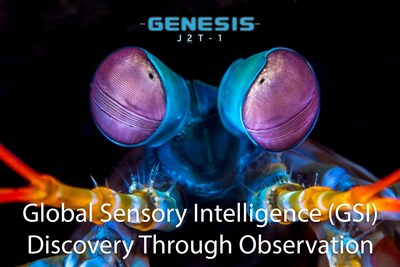Jumptuit Introduces Global Sensory Intelligence (GSI) to Reduce Geopolitical and Environmental Event Risk
PR Newswire
NEW YORK, Sept. 9, 2024
Synchronized Global Observation of Atmospheric, Terrestrial, and Oceanic Conditions, and Human Activity and Artificial Systems
NEW YORK, Sept. 9, 2024 /PRNewswire/ -- Jumptuit is pleased to announce the activation of its Global Sensory Intelligence (GSI) providing simultaneous observation of atmospheric, terrestrial, and oceanic conditions, and human activity and artificial systems.
GSI synchronizes millions of realtime data endpoints, globally dispersed, to discover probable events through unbiased sensor observation of co-occurring variables.
GSI extends an organization's range of observation to 510M km² or 197M mi², the global surface area and expands the range of perceptibility of the Electromagnetic Spectrum (EMS), infrasonic to ultrasonic, and infrared to ultraviolet.
The world's oceans constitute over 70% of the surface area of the planet, contain over 90% of the biosphere, are the conveyor of 90% of global goods traded, and are forecast to meet over one-third of the critical minerals and rare earths needed for the global clean energy transition.
Observing maritime geopolitical tensions and oceanic conditions are critical to protecting commercial shipping corridors and global supply chains. The emerging competition over deep-sea mining exploration areas for critical minerals and rare earths is taking place against the backdrop of geopolitical disruptions and environmental destruction.
Genesis J2T is able to track the clusters of cross-sector variables that constitute probable geopolitical and environmental events in areas of the oceans beyond the limits of national jurisdiction.
Genesis J2T is able to assess the risks of competing claims by nation states over jurisdictional rights to natural resources (e.g., fishing zones, offshore oil and gas, critical minerals and rare earths, renewable energy resources, critical waterways), in relation to defined and undefined maritime borders, and ocean boundary demarcations, including Territorial Seas (0-12 Nautical Miles), Contiguous Zones (12 to 24 Nautical Miles), Exclusive Economic Zones (EEZ) (12 to 200 Nautical Miles), Continental Shelves (12 to 200 Nautical Miles or Outer Shelf of Continental Margin), and High Seas (Areas Beyond National Jurisdictions).
"Whether it is dozens of Chinese fishing vessels entering the Philippines' EEZ in the South China Sea, or the Chinese government strategically installing a buoy within Japan's continental shelf boundary surrounded by Japan's EEZ, or an ultra-large container vessel on a scheduled route sailing toward gale force winds with wave heights of 25 feet on the high seas, or whether it is the race to mine deep-sea critical minerals including lithium, cobalt, nickel, graphite, and rare earths which are necessary for clean energy and military technologies, the oceans are the new theater of global competition," said Jumptuit CEO and founder Donald Leka. "The complex interplay between atmospheric, terrestrial, oceanic, regulatory, economic, political, and military factors is best understood through real-time, cross-sector observation and forecasting."
Jumptuit Editorial
Contact: Jordan Glass
Jumptuit
914.584.5022
jglass@jumptuit.com
![]() View original content to download multimedia:https://www.prnewswire.com/news-releases/jumptuit-introduces-global-sensory-intelligence-gsi-to-reduce-geopolitical-and-environmental-event-risk-302241908.html
View original content to download multimedia:https://www.prnewswire.com/news-releases/jumptuit-introduces-global-sensory-intelligence-gsi-to-reduce-geopolitical-and-environmental-event-risk-302241908.html
SOURCE Jumptuit



